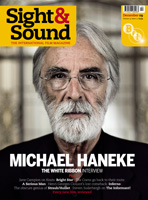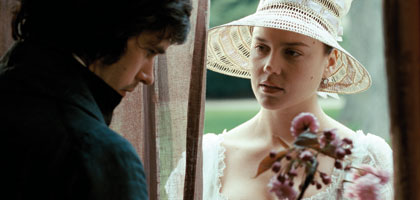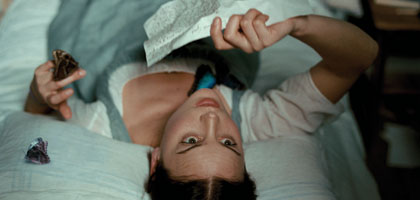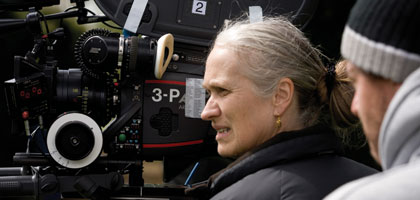Primary navigation


Jane Campion tells Nick James why she didn't want to make just another 19th-century costume drama with 'Bright Star', her portrait of Keats in love
Bright Star came to prominence as the standout 'British' film in Cannes 2009 – though it was directed by Jane Campion, a New Zealander, and starred Brit actor Ben Whishaw as the poet John Keats and Australian actress Abbie Cornish as Keats' lover Fanny Brawne, alongside American Paul Schneider as Keats' friend Charles Brown and New Zealander Kerry Fox as Fanny's mother.
Though the film sometimes drifts into narrative stasis, Campion's depiction of budding love between the near destitute poet and his fashionable neighbour amidst the pressures of ambition, family and disease is not a typical costume drama or biopic, but rather a sophisticated drawing out of tortured emotions in mostly quiet and decorous settings. It may be Campion's most subtle and most effective work yet.
Did you have a particular idea about the Romantics that led you to make 'Bright Star'?
I'd read Richard Holmes' Coleridge, which is just stunning, and then Andrew Motion's Keats. But I was trying to write a character [for a different script] – an English creative-writing teacher – and I didn't know much about poetry. Keats meets Fanny about halfway through [Motion's] book. Up until that time he was sworn against romance. He laughed when friends said they had fallen in love; he thought they were wasting their time and losing their ambition and focus. And then it happened to him! I found the story incredibly powerful and unexpected.
When you think of the Romantics, you think of a cliché, but how they themselves began was very different. Keats was just a young man who was crazy about poetry, very ambitious to do his best work and very uncomfortable with women, because he felt that they didn't like him much.
There is misogyny in some of Keats' poetry.
There is that almost classical fury of attraction to the muse, the woman who's going to take you to your knees and liberate you imaginatively but who also may destroy you, your ambition and your focus.
What were the important things to bring through from the biography?
We bought the rights to Andrew Motion's book and he became a consultant. It was fascinating for me, immersing myself and piecing together the characters. There's a lot you can know about Keats, and not so much about Fanny Brawne, because her letters to him don't exist – but her letters written after Keats' death to Keats' sister do. It took me a long time to work out who they all were.
The scenes of needles being pushed through cloth were reckoned by one critic to be about Fanny trying to break through convention. For me, Fanny is someone on the cusp between Jane Austen and the Romantics, coming from a position that's more to do with wit and reason.
She was very witty and quite wild. A contemporary described her as "everything you could mean by the word unusual". But she was also fascinated by fashion. Beau Brummel was her uncle – I didn't work that into the screenplay because he was already in exile at the time Fanny and Keats met. But she probably did learn a lot from him.
Were you wary of the biopic tag?
I thought, I'm not going to do a biopic, and anyway, I can't find a way of limiting the material in a sensible way – a biopic would be too general and too annoying. But then I realised I could do it from Fanny's point of view: meet Keats through her when she first meets him, and lose him when she does. It's like falling in love with him as she does, and also learning about poetry as she does, because she's not much initiated into poetry. She likes novels and other things. Most people today are a little bit overwhelmed by poetry. I certainly was.

The more fanciful sentiments of the Romantics can seem a little overblown today. Did you find a way to deal with that?
I tried not to force [poetry] down the throat. I wanted to introduce it the way that I became enthusiastic about it, which was to hear about sly rhymes and think, Hmm, this sounds sexy. After the letters and the biography, I started on the poems, and even if sometimes I'd really wrong-foot the meaning, I realised it was all right. It's like in the film when everyone finds 'Endymion' difficult, Fanny does too, but the poem's beginning is something really beautiful. I withheld the poetry until Keats starts with, "When I have fears that I may cease to be/Before my pen has gleaned my teeming brain."
It's almost like a soliloquy from Shakespeare, yet really it's just Keats saying, "I hope I can reach my potential." Then, once you get to 'Ode to a Nightingale', a fantastic poem, I hope people will be relaxed enough to hear a couple of verses, and go, "Wow, that's like flying."
The poetry creeps up on people. The film has a sort of gentle ease that's unlike your other films. It's a more discreet kind of cinema. Is that fair?
I think so. I've changed too. The project has brought out different things in me and I really value the tenderness and gentleness inside it.
How did you go about casting?
I asked [executive producer] François Ivernel of Pathé, who knows the English scene much better than me, who could possibly be Keats? One of the first people mentioned was Ben Whishaw. So I went off to see Perfume and I thought, "No, you're kidding – it's so not going to happen." Later on people told me about the Hamlet he'd done, and then his agent sent pictures of him looking like a rock star. Ben wrote me a letter and he obviously really responded to the story, so I was looking forward to meeting him. I was open about it. I saw a lot of people. But he did a really amazing audition – he'd go anywhere, and I love an actor like that.
With Abbie [Cornish, who plays Fanny] I did not expect to be casting an Australian. She was the first person I saw and I thought, she's great – can't wait to see all of the others. In the successful Australian females in the cinema you can see that they've been encouraged in a different way to their young British counterparts. It makes them quite strong.
Casting Kerry Fox as Fanny's mother creates a link with your previous film about a poet – 1990's An Angel at My Table – in which she played Janet Frame.
I'm really pleased with how Kerry and I worked together. I didn't know it was going to be so rewarding to revisit that relationship because people change so much, but she's so easy for me to talk to and work with. If I say, "I've had this idea, can you do something with that," she just unfailingly does pick it up and put it together better than you can imagine.
In costume drama there's often a type of acting that's different from the sort you usually encourage. Did you have to de-programme the actors?
I chose actors who aren't very programmed anyway. Abbie's terribly instinctive and can only do what she believes in. She's not the sort of person that you say, "Do this," and she says yes. If it goes through her and feels right she'll do something incredible, but if it doesn't, she won't want to do it. We just talked a lot about being rather than acting, finding that essence of your character and then trusting it.
Fanny is presented as someone who has her own artform – fashion and needlecraft – that seems as if it might be going to match Keats' artform of poetry. But then there's that line that says it's not about craft.
When she asks about the craft of poetry and he says, "Fuck craft," basically – it's about something much deeper.

How did you approach the look of the film?
When I wasn't making movies I was looking at old films. I was really taken by the simplicity of Bresson's A Man Escaped. It's so tense that I realised visual manipulations sometimes take something away from a story, Because the Keats story is so powerful, you just want to give it its space and feel like you're in the story without the authorship being too present. So I tried to disappear.
That's also a good way of not allowing the costume drama to take over too much.
Yeah, there's not a lot of sweeping crane shots. Sometimes I felt that some of our younger crew were disappointed that the big machines weren't taken out more and given a go. They were like, "Are you going to move the camera?" Some of them became genuinely worried for us.
There's also the problem of creating a plausible semi-rural Hampstead, which is now of course part of inner London.
You mean my embarrassing Hampstead like an Italian hill town? If you look at Constable's paintings of the time, he painted in that area and it did look completely rural. The road into London looked like a country road. Hampstead at the time was a place where people took the waters. It was the Vale of Health.
There's the weight of convention in the film because she's not supposed to marry someone who has no means.
They have the peculiar circumstance of being together all the time, because they shared a semi-detached house, which was really their fate. They had all this ability to see each other every day, which is what any of these romances breeds upon.
How was that allowed to happen?
It was an oversight by her mother and the people around her. I don't think they ever thought that someone as involved in fashion as Fanny, who was probably expecting a good marriage, would fall for someone so unsuitable. I think they thought she had sense on her side.
There were two moments in the film in particular that really got to me. The first was the opening of Fanny's present to Keats, the pillowslip.
I don't know why that is so what it is. I guess she was doing her best for him. I made that up, obviously. Keats did get invited to Christmas with the Brawnes, but it was up to me to invent whatever I wanted.
I also loved the final shot of the grieving Fanny walking through the wood reciting 'Bright Star', which is sublime.
That was actually [cinematographer] Greig Fraser's idea. We talked a lot about how simple we wanted to keep everything. He said, "I think you should just do a really, really long track. We can do it in one shot and we'll avoid getting too close to her until this point. And then, because we've been very intimate with her during the story, we'll just bring it into a close-up and stay with her as long as we can."
I didn't know how Abbie was going to read the poem. I thought it would be a brittle, stumbling affair. We compromised. She thought she was going to just read it and I said, "No, it's a lifebuoy at this point." So we're discussing it and it's getting darker and we've got five minutes. They are wonderful, these young actors. They really want to give you what you want, but they also want to be free, they don't want to be anyone's pet. It's that tension all the time of "Go away, I'm independent," and "I really want to please you." That's really moving.
'Bright Star' is released in the UK on November 6.
Too late for antique vows: Graham Fuller explores how Bright Star is less a biopic of Keats than a dreamy evocation of his poetry (see Sight & Sound December 2009)
Sex and self-danger: Graham Fuller on female sexual masochism in In the Cut (November 2003)
Soul survivor: Kate Pullinger on Jane Campion's return to present-day Australia with Holy Smoke (October 1999)
In the Cut reviewed by Leslie Felperin (December 2003)
Holy Smoke reviewed by Stella Bruzzi (April 2000)